MercoPress. South Atlantic News Agency
Tag: SELIC
-
Monday, January 19th 2015 - 07:10 UTC
Brazil central bank expected to raise interest rates this week for third time running
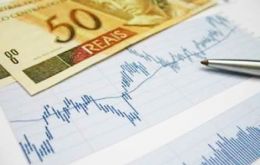
Brazil's central bank is expected to raise interest rates for a third straight meeting this week to quell any doubts about its commitment to ending years of high inflation.
-
Thursday, October 30th 2014 - 10:39 UTC
In a divided vote, Brazil's central bank raised the Selic rate 25 points to 11.25%
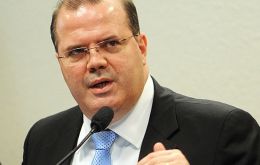
In a surprise move and in divided vote (5 to 3), Brazil's central bank monetary board, Copom, decided to raise its benchmark Selic rate by 25 basis points to 11.25%. A majority of economists and analysts anticipated that the bank would opt to keep rates unchanged.
-
Thursday, July 24th 2014 - 23:34 UTC
Brazil's priority is curbing resistant inflation, say central bank minutes

Brazil's central bank indicated on Thursday it is unlikely to cut interest rates any time soon and instead is focused on curbing resistant high inflation even as the economy flirts with recession. In the minutes of its last policy meeting, the bank stressed that interest rates at current levels should help ease inflation in coming years.
-
Tuesday, May 20th 2014 - 08:42 UTC
Rousseff announces 70bn dollars for Brazilian agriculture at 6.5% interest

President Dilma Rousseff announced Monday that the government will make available to Brazil's farmers and ranchers a 156.1 billion Reais (70.5 billion dollars) credit line, a hike of 14.7% over the previous season.
-
Thursday, April 10th 2014 - 06:28 UTC
Brazil's March inflation marks the steepest increase for the month since 2003
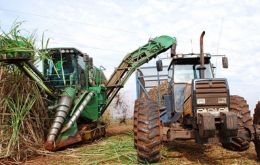
Brazil’s rate of inflation in March picked up at the quickest pace in 11 years for that month, challenging the central bank’s plan to stop raising interest rates soon and complicating President Dilma Rousseff chances of re-election.
-
Monday, April 7th 2014 - 06:36 UTC
Brazil's high yield bonds again attract foreign investors

Brazil’s decision to hike its key interest rate to 11%, its highest level in two years, has again started to attract investors since there are also strong hopes that Brazil’s next president to be elected in October will rein in spending and adjust macroeconomic policies.
-
Thursday, April 3rd 2014 - 07:21 UTC
Brazil central bank raises benchmark Selic rate to 11%
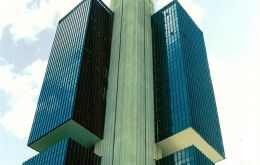
Brazil's central bank raised its benchmark Selic rate to 11% from 10.75% on Wednesday, prolonging its tightening cycle after a surge in food prices that has stoked already high inflation in an election year. The bank's decision was unanimous and left the door open for possible further rate hikes.
-
Thursday, February 27th 2014 - 04:41 UTC
Brazil raises basic interest to 10,75%; same rate as when Rousseff took office

Brazil's central bank raised its benchmark interest rate Wednesday to 10.75% from 10.5%, and left the door open for more rate increases while slowing the pace of the hikes. The move continues the bank's yearlong fight against inflation even as rising interest rates and the poor performance of the country's exporters jeopardize already feeble growth in an election year.
-
Thursday, January 16th 2014 - 09:17 UTC
Brazil raised the benchmark rate to 10.5%: combating inflation the target
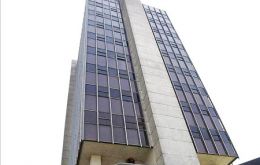
Brazil's central bank raised its benchmark interest rate on Wednesday to 10.50% from 10%, a larger-than-expected hike aimed at curbing inflation in spite of a weak economy. The decision by the bank's monetary policy committee, Copom, was unanimous.
-
Friday, January 10th 2014 - 06:40 UTC
Brazil treasury pays highest yield to launch new 10-year fixed-rate domestic bond

Brazil's Treasury on Thursday paid the highest yield ever to launch a new 10-year benchmark fixed-rate domestic bond. The Treasury said it sold two million NTN-F bonds maturing in January 2025, worth 1.64 billion Reais (683 million dollars), at a yield as high as 13.3899%. The bond is expected to become Brazil's new 10-year benchmark paper.
